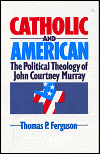
|
The Believer As Citizen: John Courtney Murray in a New Context , by D. Thomas Hughson
Paulist Press (July 1993) [From the Publisher]: In recent years religious leaders of mainline Christian and Jewish groups have been calling on their adherents to play a larger role in the creation of a just social order. One of the most publicized of these was the declaration of the American Catholic bishops, Economic Justice For All. It remains to be seen whether believers raised in an era of affluence are deeply committed to the plight of the needy, and whether religion itself can mark out a path between social activism and conventional party politics. John Courtney Murray (1904-1967) was a pioneer in the ongoing dialogue about the role of believers in public life. For all of his contributions, however, Murray spoke in a patrician manner to a social order that was stable and structured. How useful are his ideas in an age of multiculturalism, when the strongest pressure for justice comes from grassroots organizations of the poor and marginalized? The Believer as Citizen proposes a fresh view of Murray's public philosophy in a way that makes it applicable to today's conditions.
|

|
John Courtney Murray and the Growth of Tradition, by J. Leon Hooper.
Sheed & Ward (November 1, 1996) [From the Publisher]: John Courtney Murray was the most significant figure in bring together Catholic and American tradition in the 1940s, 50s, and '60s. This volume brings together twelve of the foremost Murray scholars to plumb his work for resources to respond to today's questions.
|

|
Catholic and American: The Political Theology of John Courtney Murray, by Thomas P. Ferguson.
Sheed & Ward (July 1, 1993) |

|
John Courtney Murray and the American Civil Conversation, edited by Robert P. Hunt and Kenneth L. Grasso.
Eerdmans Pub Co (June 1992) Book Reviews
John Courtney Murray and the American Civil Conversation - Review by Neal Fuller The Acton Institute. |

|
The Search for an American Public Theology: The Contribution of John Courtney Murray, by Robert W. McElroy.
Paulist Press (May 1989) [From the Publisher]: A synthesis and critical evaluation of Murray's social writings which argues that Murray's life work still represents the best starting point for public theology in the United States of America.
|
